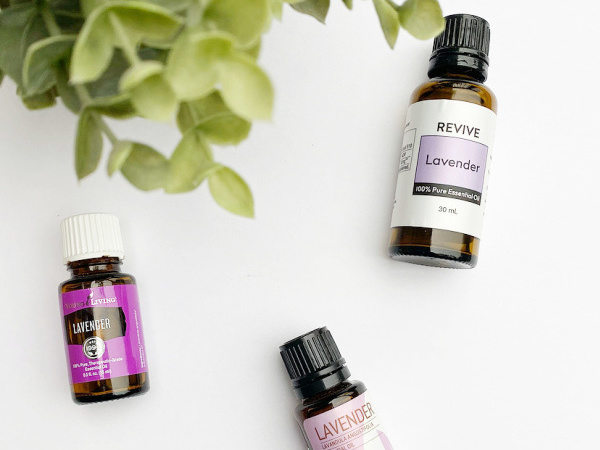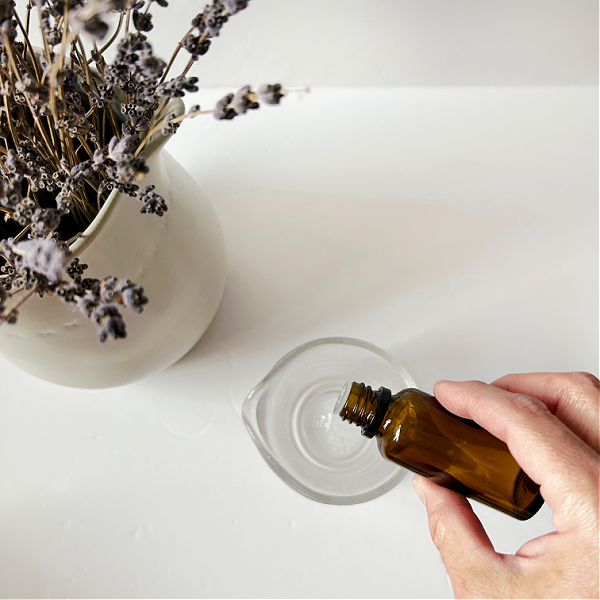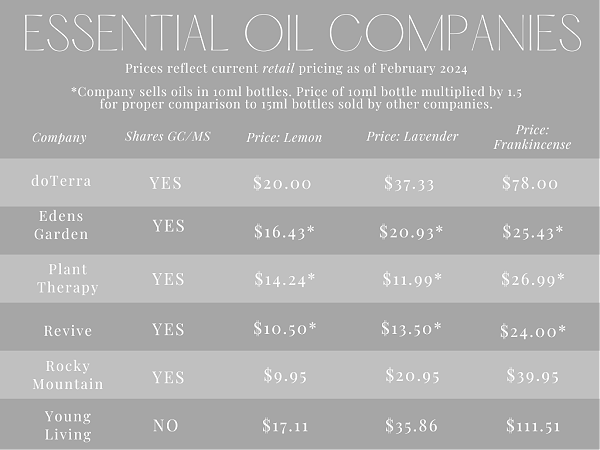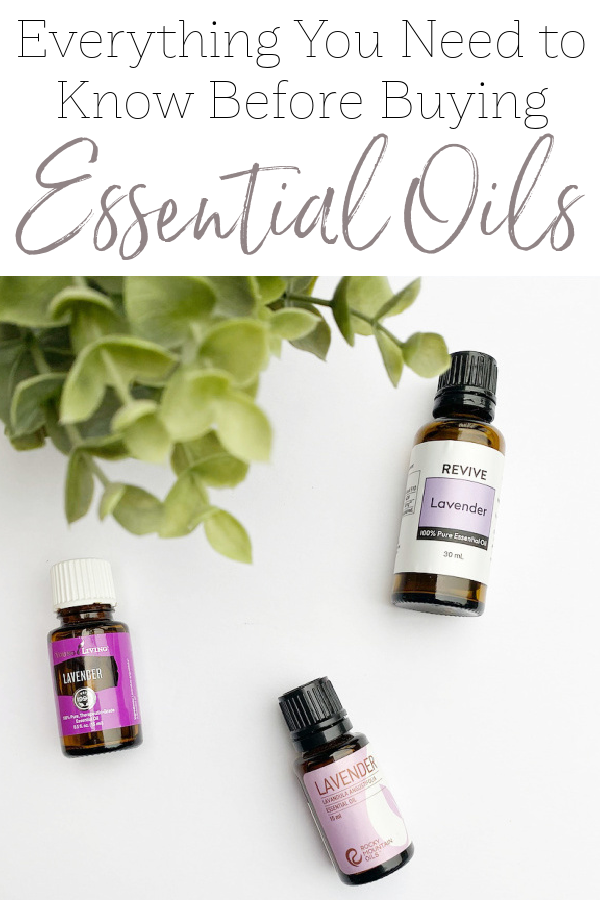Before we begin discussing where to buy essential oils and which essential oil company is best, let me start by saying, “I am not trying to sell you anything”. I am not a part of a MLM. I have used several different brands of essential oils in my own home, and have liked them all. The following information is meant to help you decide where to buy essential oils based on what is important to you!

THIS POST CONTAINS TWO PARTS
Part 1: Types of Essential Oil Companies
Part 2: Things To Look for When Choosing An Essential Oil Brand
I use essential oils quite a bit in my home; mainly to make homemade cleaning and personal care recipes. I do this because companies do not have to disclose any information about which ingredients they use in their fragrance formulas. That means I could be washing my hands or putting on lotion or doing laundry with any of the 3,500+ fragrance ingredients approved for use by the International Fragrance Association. I am not saying these 3,500+ ingredients are unsafe, but rather, I want to know what I’m spraying around my house or putting on my skin, so I prefer to use essential oils for fragrance.

When I first looked into using essential oils, I got very overwhelmed. How was I supposed to know which brand of essential oils to buy? They all stated they were “100% Pure” or “therapeutic grade”, yet the prices were all over the place; ranging from a couple dollars to hundreds of dollars. If my goal was to make quality cleaning and personal care recipes, I didn’t want to buy the cheapest essential oils out there, but I also didn’t want to overpay. I ended up going on a deep, deep dive into the world of essential oils. I researched and called various essential oil companies to learn about their practices. (Can you tell I’m an enneagram 5?) Unfortunately, there’s a lot of “not so great” stuff out there; lots of companies saying their essential oils are pure… and they’re not. Lots of companies overcharging for their “name brand” essential oils. I decided to put together some of the information I found to help guide you as you consider where to buy essential oils.
Where You Can Buy Essential Oils
MLM Essential Oil Companies
Have you heard of doTerra or Young Living? If so, then you have encountered a Multi-Level Marketing company, also referred to as a MLM. A MLM often has requirements for joining their marketing network, and you typically need to purchase a certain amount of product each month in order to earn commissions. While earning a commission may sound great, please refer to each MLM’s individual income disclosures. They often reveal very few people in their network actually earning more than a few dollars each year. While you can purchase essential oils from a MLM without joining their network, you will find their prices are the most expensive in the industry. (You can check out a price comparison chart at the end of this post of more details.) You may have a friend or family member that is part of a MLM, and if you want to support their business efforts, go for it! If you want to see if you have what it takes to rise to the top of a MLM and earns millions, you can do that too. The choice is yours.
Direct-to-Consumer Essential Oil Companies
As essential oils become more popular, it seems a new company pops up every day. Direct-to-Consumer companies are selling their products (typically online) directly to you. You place an order and they ship it to your door. The positive of this is that you can order as much (or as little) as you want, unlike MLMs that may require you to purchase a certain amount of product to get started. You can also place orders as often as you wish, or never again, with no strings attached. Essential oils from direct-to-consumer companies tend to be a significantly lower than MLM companies. However, please read about pricing below. If the deal is too good to be true, it probably is.
Buying Essential Oils At the Grocery Store
It seems you can buy essential oils everywhere nowadays: whole food stores, grocery stores, drug stores… I even saw some in the Target Hot Spot! While it may be tempting to grab a bottle while you’re out, make sure to read the label. Often times the essential oil is heavily diluted with other ingredients. Not only that, many essential oil brands claiming their essential oils are 100% pure are, in fact, not actually pure at all. Here is an example. Or, if you have several minutes and want to dive deeper, you can watch this video.
Three Questions to Ask When Choosing An Essential Oil Brand
Affiliate links may be used. Please see our advertising disclosure for more information.
Does the Company Provide GC/MS Test Results?
As a consumer, the best tool you have is a GC/MS test. This test breaks down the properties of an essential oil to make sure the oil is pure and unadulterated. Many companies provide GC/MS test results for their oils, and I would strongly suggest finding a company that does. You need to be careful and know what to look for as companies can alter oils to get a “passing grade” or use outdated reports that are not relevant to the lot number on the bottles being sold. (See this post on Facebook for more on what to look for.)
Popular Essential Oil Companies that Provide GC/MS Results for Their Essential Oils
doTerra | Edens Garden | Plant Therapy | Revive | Rocky Mountain Essential Oils
Does the Company Provide CORRECT Information on How to Use Essential Oils Safely?
Proper Dilution: Essential oils are potent and every single one should be properly diluted. I, personally, would steer clear of essential oil companies that recommend applying oils “neat” (undiluted) or at high concentrations (such as a 50% ratio; which would be 1 drop essential oil to 1 drop carrier oil). Essential oils should really be diluted to 1-5%, meaning no more than 5 drops of essential oil in a teaspoon of carrier oil; and this is only suggested for short-term use. If using an oil long-term, it should really be diluted to 1-2% (or 1-2 drops essential oil/teaspoon of carrier oil). Applying an essential oil undiluted or at high-concentration means you increase your risk of skin reactions or developing sensitization issues later on. I have found this dilution chart from Rocky Mountain Oils to be helpful.
Internal Use of Essential Oil: I know this is can be a highly debated topic. Some will say they’ve ingested essential oils for years and are better for it. However, I (personally) don’t think internal use of essential oils offers the best benefit; and should certainly not be done without supervision from a medical professional with proper training on the internal use of essential oils.
Popular Essential Oil Companies that Provide Safe Usage Standards for Their Essential Oils
Safe Usage is defined as providing proper dilution rates and advising internal use by done under medical supervision, or not at all.
How Much Do the Essential Oils Cost?
There is a wide range of pricing when it comes to essential oils. Let’s take a look at Frankincense, for example; specifically Boswellia Carterii (look at the scientific name because there are different species). If you go to a MLM company, this oil costs around $156-$223/ounce (for non-members). Go to a Direct-to-Consumer company, and it costs about $48-$80/ounce. Go to Walmart, and you can get it for $3.50/ounce! Ummm… that just doesn’t add up!
I would definitely avoid super cheap essential oils at the grocery store, but if you’re asked to pay double the price of what the essential oil should cost, that’s not fair either. Below are a few prices of popular essential oil companies for comparison.

I truly hope you have found this information to be helpful as you look for an essential oil company to call your own. Don’t be afraid to try a couple essential oil brands and see which one you like best.
Love it? Pin it!

